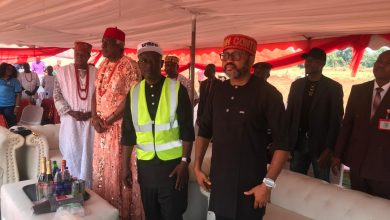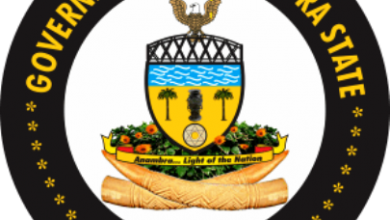Sunday Akanite A.KA Oliver De Coque mesmerized the world for over four decades with his style of music before he passed out eventually seven years ago at a hospital in Gbagada, Lagos State where he resided after taking ill for just a day.
In the previous years since after the death of Oliver De Coque; a musician who I greatly cherished because of the messages he passed through the instrumentality of his music, I have remained consistent in writing a tribute for him to espouse to the world the hidden genius in the man. A man whose music is a strong contrast from the type of music that is today being played by youngsters whose only skill in music is the ability hold the microphone the right way and coupled with the youthfulness to prance around the stage, just as ability to infuse vulgarism is an added advantage.
For Oliver De Coque, the story was different. He carved a strong niche for himself, a dress sense that cannot be anyone’s, a mastery of all musical instruments including the mouth organ, guitar; upon which he had a dexterity on and also the band and several others. To youths of today, music is a stepping stone to wealth and fame, but to Oliver, music was a means of entertaining others and also passing useful messages and at the same time making them happy. No wonder, Oliver started playing music at a tender age, at a time when there was ‘nothing’ to be proud of in being a musician. Musicians back in the days were seen as lay-abouts and never-do-wells, and above all, deviants who extol promiscuity. In the case of Oliver, he was only a youngster as at the time he started making music, and the last thing in his mind was fame or money, but to enjoy himself. He continued in what he did and wealth and fame eventually smiled down on him.
In this year’s tribute to Oliver De Coque, just as in other years, I travelled from Awka to his home town, Ezinifitte, Nnewi South Local government of Anambra State to see what change has occurred since last year, but I will not also dwell on how forgotten or how defamed the music star has further been. I have done so in the previous years and even urged his state’s government headed by Chief Peter Obi and Chief Willie Obiano, at different times to honour him, all to no avail. I may still toe this line in years to come, but for my tribute this year, let us use the messages in Oliver’s music to tackle those who have always criticized Oliver for being partly responsible for the erosion of the civility in the Igbo culture and norms which primarily are respect for elders and neighbours above wealth and others. This group has always insisted that Oliver promoted decadence in the society and a culture of fraud, so long as the end point is acquisition of money.
One of my best albums sung by the sage is Peoples Club. This album which popularized several men of wealth and had also generated criticism from the people in which they say that Oliver used his style of music to promote evil men in the society, which the members of the Peoples Club were thought to be was very ill conceived. Oliver never asked anyone to engage in fraud so as to make money to qualify being featured in his music. He rather praised men of means and encouraged hard work for people to ascend to such league.
90 percent of the music Oliver made during his lifetime was in Igbo language. He popularized Igbo language to the point that those who did not understand the music still danced to his tunes and longed earnestly to be interpreted his lines to. Singing in one of his hits about his visit to America, Oliver said “…ufodu ma’gba egwu, ufodu anuri’fea anekwu, oruo ka egwu kwusiri, ndi Ocha asupu oyibo, Oliver De Coque we want some more music!” This means that while playing for the whites in America, they danced to it, including those who did not know how to dance and those who did not understand what the music meant, and when the music drew to a halt they shouted and said “Oliver De Coque, we want some more music.” This music was sang at a time when Igbo scholars had not started shouting of Igbo language going into extinction.
Similarly in another track, ‘Ngiligbo’, which is a combination of English and Igbo language, Oliver admonished and said; “Onye asu zila Engiligbooooo” This means people should stop speaking a combination of English and Igbo language. He admonished that people who want to speak English should do so, and if they wanted Igbo language they should too, but mixing both languages will amount to committing, ‘Engiligbo’.
For those who argue that Oliver particularly sang about men of means because of the money he is wont to collect from them, I say this is still untrue. He simply made music the best way he could and enjoyed himself by so doing. A check on some of Oliver De Coque’s album will show that he also dedicated tracks to deceased friends of his. And now, one will be prompted to ask, if Oliver is after the money of men of means, who pays him when he praises a demised man of means?
In one of them he sang; ‘ka anyi chete nu ndi otu anyi ndi jere obodo afudebe, maka na onye chi ya kporo oku na ikpe ama ro ya. Peoples club na ife melu anyi ma ya dibaooo… oburu na onwu na eri ego anyi ebute egooo, oburu ife ana luru ogu na mgba umuibe anyi ejebe… onwu zulu uwaaaa, onwu zulu uwa egbuo nueee… For non-Igbos, you do not need to bother, as Oliver here was just musing about death and how it takes people without negotiation. He stated that if death was negotiable, the members of people club who are mainly men of means would negotiate the death of their own, or even mobilize for war if it was about strength. He in another track also eulogized Johnny Wood, a good friend of his who died in a motor crash and posited that …mberede nyiri dike, Johnny esoro ugbo ana naba, onwu ana atuegwu, onwu ana atu uche egbu ewooo. This means that death is so fearless and so stupid that it does not have a rethink before going for anyone.
Lets talk about some of other Oliver’s hits, that are away from praise singing. Who can forget the great track, Biri Kam Biri, which literarily translates to live and let live. In times like this when the world is so much in need of love, people like Oliver should be praised for dedicating tracks to ensuring peace in the world. In that hit, Oliver sang and urged all to try to live in peace with others, stating that; onye azola uwa azo, uwa ga basi onyeobula; lets not struggle because the world is a big place and can accommodate all.
Without wanting to write a long epistle, or wanting to espouse all of his album or tracts as they are too many of it, I will only want to leave my readers of this years tribute with this solid tracks of his; Uwa aburo ebe ezimike, where he insisted that the world is not a resting bplace, but a place where mortals come on a journey and retire later. Sounds like preaching the gospel to sinners to bear in mind that there is a better home somewhere beyond.
He it was who in another track canvassed the need for every man to own his own house. Saying; Nwoke ruo ulo nke ya, akpo ya landlord, oza, Nwanyi ruo ulo nke ya, akpo ya landlady oza, ochoro iku flower okubazie, maka na ulo bu nke ya, ocho ikpa ewu na okuko, okpaba zie maka na ulo bu nkeya… simply he was saying that if a man built his own house he becomes a landlord, and whatever he wished to do in it, including rearing animals he did. In another line he posited that any man who lived in another man’s house should not plant flowers, as if his landlord quits him, he will not relocate with the flowers.
Quite Ironically, the palatial mansion of the great sage has continued to rot in Ezinifitte, Nnewi where his remains were also buried. During my visit this year in September, the very imposing edifice is still standing strong, but looks so very deserted as members of his family prefer to stay in an adjoining smaller house. Even the tomb of the great music maestro has remained uncemented, but rather used as a place to pack used rags. Oliver De Coque must be a very unhappy man in his grave, but we still remember him because he taught us great lessons through his music.
ENDS.
Like this:
Like Loading...




